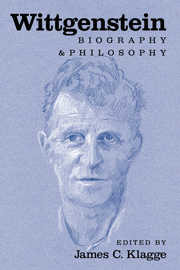Book contents
- Frontmatter
- Contents
- Contributors
- Editor's Preface
- Biography and Philosophy
- Wittgenstein
- Wittgenstein and the Mind's Eye
- Deep Disquietudes: Reflections on Wittgenstein as Antiphilosopher
- The Sleepy Philosopher: How to Read Wittgenstein's Diaries
- Letters from a Philosopher
- Wittgenstein and Reason
- Wittgenstein and the Idea of Jewishness
The Sleepy Philosopher: How to Read Wittgenstein's Diaries
Published online by Cambridge University Press: 27 March 2010
- Frontmatter
- Contents
- Contributors
- Editor's Preface
- Biography and Philosophy
- Wittgenstein
- Wittgenstein and the Mind's Eye
- Deep Disquietudes: Reflections on Wittgenstein as Antiphilosopher
- The Sleepy Philosopher: How to Read Wittgenstein's Diaries
- Letters from a Philosopher
- Wittgenstein and Reason
- Wittgenstein and the Idea of Jewishness
Summary
In the second week of November 1931, Ludwig Wittgenstein entered the following remark in his diary:
The movement of thought in my philosophy should be discernible also in the history of my mind, of its moral concepts & in the understanding of my situation
(Koder Diaries [KD] 125).Wittgenstein appears to be suggesting here that one may better appreciate his philosophy if one studies the history of his mind and understands the situation in which his thoughts originate, for example, by reading his diaries. Yet, before following his invitation to turn to the diaries, we should consider the scope of his promise and just what it means for a movement of thought to be found again in the history of a mind.
This essay entertains two approaches to Wittgenstein's remark; it criticizes the first, recommends the second. On the first reading, Wittgenstein's philosophical writing poses interpretive problems in need of solution; like pieces of a puzzle his remarks need to be fitted into a coherent whole. Emboldened by Wittgenstein's remark about his movement of thought, one therefore looks to the diaries for answers to interpretive questions. Even if they do not immediately provide a key that will unlock some hidden philosophical meaning, one expects at least to find clues or missing pieces to the puzzle.
The second approach takes quite literally Wittgenstein's repeated assertion that there is nothing hidden in his philosophy, that his remarks are “clear as crystal,” that philosophy does not present doctrines or theses. It is thus opposed to the hermeneutic strategy of drawing on diaries, notebooks, or manuscripts in order to discover a supposedly missing text for the coherent reconstruction of some element of doctrine.
- Type
- Chapter
- Information
- WittgensteinBiography and Philosophy, pp. 156 - 175Publisher: Cambridge University PressPrint publication year: 2001
- 1
- Cited by



